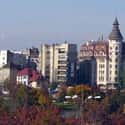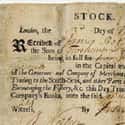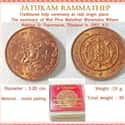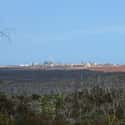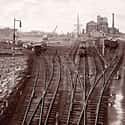(#9) In the 2000s, Crummy Communist Apartments in Romania Were Worth as Much as London Flats
A complex series of factors caused property prices in Romania, particularly the capital of Bucharest, to explode. A lack of new apartments being built from 1989 to 2005, combined with a revitalized banking system and high foreign salaries paid to Romanian expats working in the EU, caused prices to increase by as much as 1,000%. In Bucharest, that meant communist-style apartments built in the '60s and '70s were suddenly worth hundreds of thousands of pounds - the equivalent of flats in middle-class London and Paris.
More properties finally started going up, as foreign investors and shady real estate deals flooded the market, causing prices to drop. The 2008 crash hit the country hard, but values remained inflated compared to the rest of Eastern Europe.(#3) In 1720, Shares of the South Sea Company Were Worth Almost $200k Adjusted for Inflation
Britain's South Sea Company was formed in 1711, and was promised a monopoly on all trade with the Spanish colonies of South America. Expecting a repeat of the incredible success of the East India Company, investors snapped up shares, and they surged more than eight-fold in the first half of 1720, reaching a price of £1,000, or £134,000 adjusted for inflation. A slew of copycat companies started, and England went IPO crazy.
But the South Sea Company was a mess - poorly run and unprofitable, with shipments being misdirected. Company directors realized the Company couldn't possibly deliver on its lofty promises, and sold their shares just as shareholder payments were due. Panic set in, and the Company collapsed in subsequent months. Only direct intervention by the British government saved the UK's economy from going under, and Britain banned the trade of stock certificates until 1825.(#6) In 2006, Cheap Thai Amulet Sold for Tens of Thousands of Dollars
One of the strangest bubbles in history began with the death of an octogenarian Thai general in 2006. Longtime head of the Thai police, Phantarak Rajadej was renowned for solving a difficult murder case with the help of an amulet bearing the image of the Thai god Jatukam Rammathep. Overnight, demand for the amulets exploded.
Thailand went amulet crazy. Wearers slung multiple Jatukam amulets, all blessed by monks and bearing names like "Super Rich to the Heavens," around their necks. The amulets, which normally sold for $1.20, became the sole commodity in a huge bubble, with some selling for as much as $75,000. The amulet market swelled to a value of more than $600 million. Then, suddenly, Thais began to wonder how so many amulets could actually blessed by monks; were most of them fake? Also, they weren't getting rich or gaining immortality.
The amulet industry went bust almost as quickly as it went boom, leaving thousands of buyers out large deposits, and others stuck with worthless knockoffs. Also, it was found that the Thai god the amulets supposedly paid tribute to wasn't a real god in Thai culture.(#8) In 1969, a Ton of Nickel Could Buy You a New House
The Poseidon bubble of 1969 inflated when the Australian mining company Poseidon NL found a promising nickel source in rural Western Australia. With the Vietnam War going on, nickel was in high demand, and the world's largest nickel company was going through a prolonged strike. Low supply and high demand equaled a bubble.
Sure enough, Poseidon's shares went from 80 cents in September 1969 to $280 in early 1970. At the same time, nickel went nuclear, with the metal trading at £7,000, or almost $17,000, for one ton by late 1969. By contrast, the average cost of a new house in the US in 1969 was $15,500 - or slightly less than one ton of nickel.
Naturally, the Poseidon bubble didn't last long. The company's stock crashed in February 1970, while nickel prices dropped naturally. When Poseidon did start mining its nickel, it was found to be low quality, meaning it was expensive to extract. Poseidon went bust in 1976.(#4) In 2008, Rhodium Was Worth Ten Times More Than Gold
While the world was scrambling to keep pace with the 2008 financial crisis, another bubble inflated and popped - rhodium. A rare metal used in catalytic converters and jewelry plating, rhodium traded for just $500 per ounce in late 2006, a price that mysteriously exploded and reached a staggering $9,500 per ounce in summer 2008. By contrast, gold was trading for $870 per ounce, making rhodium more than ten times more valuable.
Just as strangely as it started, the rhodium bubble popped. By January 2009, it was back to $1,000 per ounce.(#5) In the 1840s, British Railroads Suddenly Doubled in Value
Having retained nothing from the South Sea Bubble, 1840s Britain was gripped by "Railway Mania", a frenzied, speculative railroad building market. In 1830, the first modern city-to-city railroad opened and was immediately successful. Combined with the 1825 repeal of the Bubble Act, an interest rate cut, and a flood of new money from the Industrial Revolution, railways became the hot investment.
Railroad stock prices doubled from 1842 to 1845, and hundreds of new railroad charters were passed by Parliament. But by 1845, it became clear that most of these railroads would be money-losers. Others proved impossible to build, and some were simply scams. A Bank of England interest rate hike finished off Railway Mania, and thousands of people lost their life savings. Of the railroads that did get built, many are still around today, and the boom led to a major increase in the interconnectivity of English cities.
New Random Displays Display All By Ranking
About This Tool
The origin of the economic bubble was the Dutch tulip bubble. Since the 17th century, there have been several huge financial crises spreading across the world. During the economic bubble periods, it caused huge chaos in the operation of the society and economy, and the prices of many things soared to absurd levels. An economic bubble is a series of asset price inflation, which rises sharply in a continuous process, its market price far exceeds the value it actually represents.
Speculation is still a trend in modern society, and under its impetus, asset prices continue to rise. Looking back the history, the random tool tells stories of 11 absurdly priced things in history.
Our data comes from Ranker, If you want to participate in the ranking of items displayed on this page, please click here.










